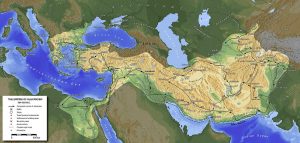From a humble middle-class family to the stern, no nonsense dictator of Italy, Benito Mussolini grew his following from the ground up. Mussolini’s campaign erupted on the current discontent with the Italian economy and political field. Italians felt Italy didn’t get justice in terms of territorial settlements at the end of WWI despite being on the winning side. Socialists and communists were fighting for their view of a future Italy, scaring many in the middle class. Italy was also hurting economically, as the Italian economy was stagnant after WWI. Many of those who were hit hardest by the economy were also in the middle class.1 However, there were many other moving parts as to why Mussolini came to power. Overall, individuals wanted to see a drastic and significant change in Italy, and to them, Mussolini was the answer.

In 1912, Mussolini was a young socialist involved in Italian politics. That same year Mussolini started editing for the prominent socialist newspaper Avanti!2 There he developed his views, and advocated against Italy joining WWI when it broke out in 1914. Mussolini did this to support the decision of the Italian Socialist Party, which had dismissed the war after a group of anti-militarist protesters were killed. However, thereafter he did a complete about-face and began strongly advocating for Italy’s entrance to the war in Europe. He saw the war as an opportunity for his own ambitions too. Two years later, after advocating for Italian participation in the war, Mussolini left the Socialist Party and began his own movement. At that point, Mussolini’s views underwent a complete change as well. Taking a break from politics, Mussolini volunteered and served with distinction on the Italian front in 1915. He was severely injured in 1917, and was forced to leave the war and the army.
When Mussolini returned to politics in 1917, he promoted nationalism, militarism, and the restoration of the bourgeois state. Mussolini did not like where Italy was heading in terms of its foreign policy and its domestic economy. Mussolini had the vision of returning Italy to the grandeur of the Roman Empire. Furthermore, he wanted to be like a modern-day Julius Caesar ruling over his nation. He could not sit around and watch Italy fall even further into a recession, or be pushed around by foreign powers. Mussolini began to promote his ideas in his newspaper, Il Popolo d’Italia.3 In 1919, Mussolini started surrounding himself with sympathetic minds, like General Emilio De Bono, Italo Balbo, Cesare De Vecchi, and Michele Bianchi, growing his following so he could create his own political party. As his organization broadened, his supporters started wearing black shirts to their rallies. In 1922, Mussolini found his opening into national politics. Blackshirt volunteers crushed a strike called for by trade unions, and in the process, his party began to gain the support of many Italians who found Mussolini’s nationalism appealing, mainly among the middle class. However, Mussolini was also supported by veterans, industrialists, and bankers. He urged his supporters to march to Rome with him, like the great Giuseppe Garibaldi did after he unified Italy in the nineteenth century.4 Mussolini stated that either his party, the Fascists, would be given power, or they would take it themselves by force.

In the months leading up to the march on Rome, Mussolini began taking action, preparing for what would happen after they went through with it. Mussolini placed Bianchi in charge of political matters, and the other three were to take charge of the military operations. This allowed Mussolini to be free and more flexible. The Blackshirts’ first objective was to seize the towns around Rome. After the towns were seized, fascist columns of Blackshirts were to converge on Rome. The official date of the march was to begin on October 24, 1922, at a rally in Napoli. As the days led up to the march, Luigi Facta, Italy’s Prime Minister, became increasingly worried about his position as Prime Minister of Italy. In a last-ditch attempt to protect his position, he ordered a proposal of martial law. The order would have placed the army in between the government and a fascist takeover. However, the order needed to be signed by King Victor Emmanuel III. After consideration, the King was not confident in the loyalty of his army and feared a revolt that would jeopardize his power. For that reason, he did not sign the order on October 29, which effectively forced Facta out, making Mussolini the new premier of Italy. On October 30, Mussolini arrived in Rome in a sleeping car with 30,000 Blackshirts following behind. He presented himself to the king by announcing, “Majesty, I come from the battlefield—fortunately bloodless.”5
- Ronald Sarti, “Fascism and the Industrial Leadership in Italy before the March on Rome,” Industrial and Labor Relations Review 21, no. 3 (1968): 400-5. ↵
- Charles Delzell, “Benito Mussolini: A Guide to the Biographical Literature,” The Journal of Modern History 35, no. 4 (1963): 340-44. ↵
- Christopher Hibbert, Mussolini: The Rise and Fall of II Duce (New York: Macmillan, 1987), 89-94. ↵
- Global Events: Milestone Events Throughout History, 2014, s.v. “Benito Mussolini Marches on Rome.” ↵
- Salem Press EncyclopediaResearch Starters, 2017, s.v. “Mussolini’s “March on Rome,” by Harold A. Schofield and John Quinn Imholte. ↵



20 comments
Aaron Sandoval
This article was very well written and did a good job of covering the event. I feel as if I have a similar knowledge as many when it comes to Mussolini, he was a fascist who supported the Axis powers during World War II so it is really nice to have an article that covers who he was and how he came to power. This article did a good job of explaining how he was capable of such a feat given his middle-class background.
Kenneth Gilley
What an interesting article! It is amazing how easy it was for Mussolini to take control of Italy. Until I read this article, I was unaware of Mussolini’s march on Rome. Like so many of history’s famous dictators, Mussolini seemed to change sides whenever he felt that he could gain more power by doing so. It is amazing that he so easily convinced people to follow his dubious ways.
Danielle Slaughter
Reading this article, it amazes me how flippantly the word “nationalism” is used nowadays. Some take it to simply refer to a pride in one’s nation, but that is not the case. It is a dangerous ideology that, as evidenced in Mussolini’s case, can set one on the slippery slope that leads to fascism. Being someone who believes in the lessons of history, I cannot help but be reminded of a certain towheaded president.
Sebastian Carnero
Great article. I didn’t know about the blackshirts’ strike. It’s really scary how war can affect us. The impacts on the economy lead to impacts on our mood and psychology. We are vulnerable after the waste of resources war demands and so one selfish and ambitious guy who knows how to communicate starts promising what we want can make us do things we wouldn’t ever think of.
Tyler Sleeter
Interesting article. I like how you wrote about Mussolini’s rise to power but stopped before World War II and the time most people are familiar with. I did not know that Mussolini wanted to take Italy back to the greatness it had as the Roman Empire. It interests me that he saw an opportunity for him to rise to power and he grabbed it, rising until he was the premier of Italy. It seems to me that many dictators rise to power in a similar manner, until it is too late to stop them.
Caroline Bush
Interesting article! Its crazy to read about how Mussolini took over Italy and how he tried to shape Italy in his image. Before reading this article I wasn’t aware of the famous march in Rome that Mussolini lead. It was also interesting to read about how manipulative Mussolini was and how he only cared about his desires and opinions. Overall this was a very interesting article that I really enjoyed reading.
Fumei P.
Mussolini seems to be the product of the middle-class. It seemed like the middle-class Italians were unsatisfied with the outcome of World War I when it came to splitting up the territories, many of them felt that Italy didn’t get their piece of the pie. On top of that their economic situation didn’t make them feel better. Mussolini was already in the politics game, he was just waiting for an opportunity to move forward and take control.The middle class was desperate for change, and Mussolini took charge to fill that role and the middle-class backed him up because he was in the right place at the right time.
Timothy ODekirk
Nice article. Benito Mussolini was always that guy that I knew who was dictator of Rome during World War 2, and was a part of the Fascist party; however, before reading this article, that was the extent of my knowledge on Mussolini. I was unaware of the famous march that Mussolini led, which I found interesting. Furthermore, I find the fact that the march on Rome ended with no blood-spilled was rather interesting as well. This was a well written article, which extended my knowledge of Benito Mussolini greatly.
Brandon Martinez
Nice article! It is crazy to read how Mussolini took control officially over Italy. History showed that he was a strict leader and a villain throughout history fighting with the axis powers. Mussolini was a dictator who took a countries power by force and overpowered his enemies. This article showed how this dictator used his power to spread his influence through the country and one can say after reading this article that he was very determined as a leader.
Kailan Pena
I knew Mussolini was a terrible and selfish man, but I didn’t know he was this bad. It sounds like he undercut everyone else’s opinions, swayed people to accept his, and got close with some of the powerful people of Italy and manipulated them to do his will. I find it so strange that these people were so easily influenced and supported his aggressive and shady ways of being.